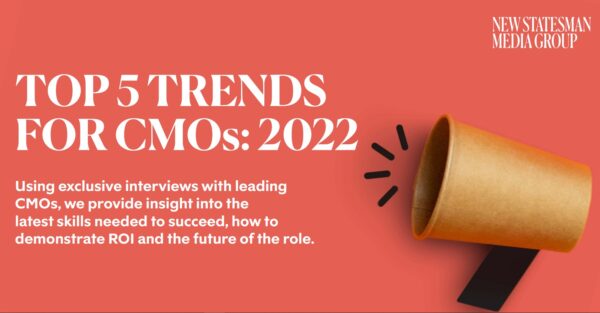
GumGum CMO interview: GumGum are contextual advertisers and we spoke to their Global Chief Marketing Officer, Erin McCallion, in the latest of Press Gazette’s Marketing Maestro interviews. This series is produced in association with Lead Monitor, New Statesman Media Group’s content marketing arm.
What’s been your proudest achievement in your current role?
It’s everything the marketing team has delivered since I joined GumGum last September, which has helped transform the business. Since arriving, the company has been in acquisition mode, buying rich media and video ad marketplace JustPremium and attention intelligence platform Playground xyz to support its growth ambitions.
In my first five months, we reviewed and evaluated the marketing team to ensure we were set up to support global expansion, planned and delivered go-to-market strategies for eight new markets and built and launched a new global website. It’s been a whirlwind time which wouldn’t have been possible without having such a talented, dedicated team whose commitment to the business’s success has been exceptional.
What media channels do you see as most important and valuable regarding marketing spend and activity?
In this complex omnichannel world, with myriad media options, you always have to prioritise people over platforms. So, as a marketer, my thinking starts with the customer, using channels to reach the audience. But it’s not simply about the media. Most important, but often overlooked, is the frame of mind of your customer: You only want to reach people when they’re in the right mindset to connect with your brand.
For example, if you’re a drinks brand and a customer is looking for cocktail recipes on a Friday night, they are in the ideal mindset to learn about your product. But when they’re looking for inspiration the next morning to burn off the calories, their mindset has shifted and it’s not the best use of your advertising budget to be front and centre.
[Sign up to Marketing Matters, our fortnightly newsletter with leading articles about marketing, advertising and publishing – and more interviews like this!]
How important to your brand is the news media (both B2B and B2C)?
As we navigate these times of huge social, economic and political upheaval, it’s never been more important to access news from a free and independent media. At GumGum, we take pride in the fact we’re working with and supporting many of the world’s most recognised publishers to report on this news.
However, today’s news environment is resulting in publishers missing out on substantial advertising revenues. This is because advertisers are adopting blunt keyword blocking solutions to protect their brand from appearing next to contentious news topics, such as the pandemic or Black Lives Matter. And in stifling revenue, this approach also undermines news output.
Advertisers themselves are also impacted. They’re missing out on genuine opportunities to reach their target audience because they lack the necessary contextual targeting and brand safety tools to allow them to identify genuine, safe opportunities.
We found that over the pandemic, 60% of news content related to Covid-19 was safe for advertising and blocked unnecessarily. Advertisers must support publishers by adopting the available technologies that allow more balanced targeting approaches to be implemented around news topics and avoid relying on crude blocking techniques.
What for you is the key to any successful marketing campaign?
When it comes to digital advertising, you can’t reduce success to just one factor. It relies on multiple ones that support and complement each other.
Firstly, there’s the environment in which the advertising appears. Using the contextual signals within an environment allows relevant, targeted advertising to be delivered at the right time to those most likely to engage with it.
Secondly, there’s the ad itself. This must be impactful, so size, placement and creativity are essential to ensure it’s seen. And by its nature, the ad’s impact must be measured, making attention time – the length of time an ad is looked at – a key metric for proving campaign effectiveness.
How important is technology in modern marketing?
It’s critical. The sophistication, scale and complexity involved in delivering effective marketing in today’s always-on world is only possible through technology.
To succeed, marketers must have a tech stack that supports their business objectives. Whether it’s identifying and targeting the right audiences at scale, delivering strong, impactful creatives or measuring success using metrics that matter, technology plays a vital role.
But we must never forget it’s not just about tech. Ultimately, making a difference and gaining an advantage comes down to intelligent, creative and insightful thinking, which resides in people.
What are the biggest pain points in a marketing campaign?
As buyer journeys shift primarily online and become more fluid rather than linear, reaching consumers has never been more challenging. And even once you’ve done this, if you’re relying on cookie-based ID solutions for targeting, recognising if they’re in the right mindset to receive your advertising is very difficult. Today, understanding the buyer journey and optimising it takes longer but is critical for effective marketing that engages consumers when they’re primed to be most receptive.
Measurements also remain a big issue. Despite the wealth of metrics available for this most measurable of mediums, digital is still reliant on viewability and click-through rate as a measure of campaign success. But these metrics fail to capture true ad effectiveness. Today, marketers need more progressive, sophisticated approaches to measurement that inform and influence planning.
Press Gazette is hosting the Future of Media Technology Conference. For more information, visit NSMG.live
 FREE REPORT: TOP 5 TRENDS FOR CMOs
FREE REPORT: TOP 5 TRENDS FOR CMOs
Insight into the latest skills needed for CMOs to succeed, with contributors including PensionBee, Mindshare and Deloitte.
Email pged@pressgazette.co.uk to point out mistakes, provide story tips or send in a letter for publication on our "Letters Page" blog
